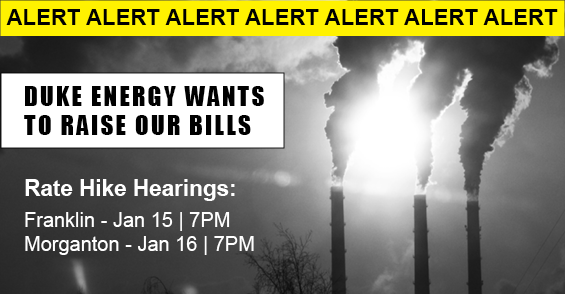


Action – or, Rather, the Lack of It – at the General Assembly
Action – or, Rather, the Lack of It – at the General Assembly
1/22/20
If you missed the General Assembly session last week, don’t feel bad. It lasted all of a day and produced, well, not much at all.
Republican leaders in the House and Senate brought lawmakers back to the capitol, hoping to override Governor Roy Cooper’s veto of the legislature’s version of the state budget. House Republicans succeeded in overriding Governor Cooper’s budget veto last fall using tactics that left many Democrats crying foul.
But completing an override takes a three-fifths vote of both the House and the Senate. And Senate Republicans have had trouble finding even a single Democrat to join them in voting to override the Governor’s veto.
Governor Cooper and Republicans in the General Assembly have been at loggerheads over the budget since last summer. Cooper insists that the legislature expand healthcare coverage via the state’s Medicaid program. GOP leaders in the General Assembly have refused and put most of their political efforts into finding the votes to override Governor Cooper’s veto of their budget.
That effort failed last week when Senate Republicans could not find the single Senate Democrat they need to collect a three-fifths majority for the veto. Without that single vote in the Senate, the effort to end the budget stalemate collapsed and the General Assembly adjourned until the beginning of the 2020 session, which will begin April 28.
So, to review: North Carolina does not have a budget. The legislature went into session to address the budget issue. The session lasted a day. North Carolina still does not have a budget.
In the absence of a spending plan for the state, any recurring funding from the last approved budget (fiscal year 2017-2018) continues. That’s why government offices are not shut down. But the absence of a budget leaves hundreds of millions of dollars unspent on education, health and human services and the environment – including open space conservation, water quality projects, clean water investments in the French Broad and other rivers, as well as new staffing needed to maintain the state’s environmental protection efforts.
Prospects for an end to the budget stalemate are nowhere in sight. In fact, last week GOP Senate President Pro Tem Phil Berger said that the legislature may not even approve a budget for FY2020-21 – its most important task for the 2020 session.
Instead, Senator Berger said, the General Assembly will leave the 2018 budget in place and, perhaps, approve smaller appropriations bills during the 2020 session. The bills could contain less controversial parts of the budget, such as the use of federal block grant funding. The General Assembly approved a number of these “minibudget” bills last year – some of which Governor Cooper signed, while vetoing others.
Here at MountainTrue, we are already beginning to prepare our agenda for the 2020 session. We will share the details later this spring, but you can expect it to include new investments in water quality monitoring, improved public access for hiking and paddling, help for the region’s farmers to pay for fencing around streams and other water quality protections, and sustainable energy policies that protect consumers and address climate change.
Thank you for making our voice in Raleigh possible!
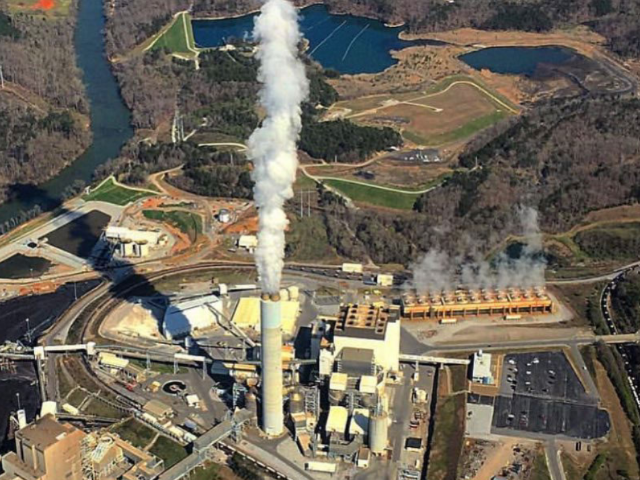
Tell the NC Utilities Commission: Enough is Enough. No More Duke Rate Hikes For Dirty Energy.
Tell the NC Utilities Commission: Enough is Enough. No More Duke Rate Hikes For Dirty Energy.
Action Expired
Duke Energy is trying to raise our electric bills to pay for dirty energy. Again. The company’s latest rate hike proposal would increase residential rates by 6.7% – or about $97 more per year for the average electricity user.
Duke should be investing in solar and wind energy on a massive scale in response to the climate crisis. Instead, Duke’s proposal lacks any direct investment in renewable energy and would raise our rates to burn more gas, create a “deferral” account of up to $2.5 billion for Duke to access in a future rate hike, and call for customers to foot the bill to clean up coal ash – even though Duke knew this coal ash was toxic as far back as the 1980s, and never acted to dispose of it properly. The rate increase would also come only two years after Duke’s last rate hike, and would be the company’s fifth rate hike in 10 years.
It’s time for the North Carolina Utilities Commission to put an end to this behavior. Take action below to tell the NC Utilities Commission: No more Duke rate hikes for dirty energy.
More About This Rate Hike Proposal
Cost
- Duke Energy wants to collect $290.8 million more from customers each year – an overall 6% increase.
- If approved, residential electric rates will rise by about $8.06 per month for a typical customer. That means the average monthly bill would increase to about $116.26.
Burning More Gas
- The rate hike would pay for Duke to convert more coal plants to be able to burn on gas in addition to coal.
- Duke should be investing in solar and wind energy on a massive scale as a response to the climate crisis. Instead, Duke is trying to recover costs for about $278 million spent for retrofitting coal units at its Belews Creek and Cliffside plants to allow them to burn gas as well as coal.
- Our climate can’t afford more gas plants. Natural gas burns methane, and methane is a more potent greenhouse gas than carbon when it leaks from pipeline infrastructure. And this infrastructure is leaking at every step of the way – from wells, to leaks at pipelines and compressor stations.
-
- Methane is 87 times more potent of a greenhouse gas than carbon dioxide during the time it remains in the atmosphere.
- A recent study published in the journal Science found that the U.S. oil and gas industry emits 13 million metric tons of methane from its operations each year—nearly 60 percent more than currently estimated by the EPA.
- While the rate hike includes a plan to phase out coal-burning at Duke’s Cliffside Unit 5 by 2026, the plan for the retrofit sets up this unit transitioning to starting to burn gas at that time. The climate science has made it clear that we cannot afford a timeline that will prepare more gas plants to begin burning well into the 2020’s. Instead, Duke should replace the Cliffside coal unit with renewable energy such as solar or wind.
Cost Deferral Account for Grid Modification
- Duke wants to set up a “cost deferral” account to pay for up to $2.5 billion that it expects to spend over the next three years on grid projects. While Duke is not seeking to fund that account in this rate case, they have said they’ll seek recovery of those costs in their next rate case a few years from now.
- The General Assembly denied Duke the ability to charge customers for future costs in their highly controversial bill SB559 this year. Now, Duke is trying another path to be able to forward the bill for these costs – but setting aside funds for estimated future costs reduces the transparency and accuracy regarding how the public’s money is spent.
Costs Related To Coal Ash
- Duke wants customers to cover their tab for the cost of cleaning up their coal ash mess over the last two years – $123.6 million over five years. These are costs associated with coal ash cleanup at the Allen, Belews Creek, Buck, Cliffside, Dan River, Marshall, Riverbend, and W.S. Lee sites incurred since January 1, 2018.
- Duke also wants customers to pay $689 million to cover the company for upgrades to deal with bottom ash treatment, wastewater processing, and lining retention basins.
- You might recall that Duke’s insurance company has refused to pay for costs associated with Duke’s coal ash cleanup because “Duke failed to take reasonable measures to avoid and/or mitigate” the damages resulting from coal ash disposal. As a result, they’re turning (once again) to the NC Utilities Commission for permission to pass the cost of their mess on to customers.
- In 2015, three Duke Energy companies including Duke Energy Carolinas plead guilty to nine criminal environmental violations for their failure to protect NC waterways from coal ash pollution.
- In 2018, it was revealed that Duke was aware of the harms of coal ash beginning in the 1980’s, but did not begin to take precautions.
- Because Duke Energy is a state-sanctioned monopoly in North Carolina, ratepayers neither have power over Duke Energy policies, nor the option of using a different electricity provider. It is simply not just or plausible for customers to keep getting their rates increased every couple of years while they are legally prevented from choosing a different company for their electricity needs.
Duke Should Pay
- In 2018, Duke had a net income of $3.03 billion but paid no federal taxes. In fact, the company is owed $647 million by the federal government.
- Compensation for Duke’s CEO Lynn Good more than doubled in 2017.
- In the years since Hartwell and SELC sent Duke Energy a 60-Day Notice of Intent to address Clean Water Act violations on the French Broad River on Jan. 24, 2013:
-
- Duke Energy’s CEO Lynn Good and her four EVP’s have taken home a combined $151,453,920 in compensation.
- Duke Energy’s Board has taken home compensation of $24,689,284.
- Duke Energy has issued a combined total of $16.707 billion in dividend payments to its shareholders.
Sources
Duke Energy Carolina’s Rate Case Filing: https://starw1.ncuc.net/NCUC/ViewFile.aspx?Id=c69824e6-f9cd-4895-a5cf-53272ffbcd51
“Here’s how much Duke Energy is seeking to raise utility rates in North Carolina” https://www.bizjournals.com/charlotte/news/2019/09/30/heres-how-much-duke-energy-is-seeking-to-raise.html
“Summary for Policymakers of IPCC Special Report on Global Warming of 1.5°C approved by governments” https://www.ipcc.ch/2018/10/08/summary-for-policymakers-of-ipcc-special-report-on-global-warming-of-1-5c-approved-by-governments/
“The False Promise of Natural Gas” https://www.nejm.org/doi/full/10.1056/NEJMp1913663
“‘No chance’ on making Duke absorb coal ash costs, North Carolina GOP says” https://www.utilitydive.com/news/no-chance-north-carolina-gop-says-on-making-duke-absorb-coal-ash-costs/552326/
“Duke Energy CEO Lynn Good sees 55 percent jump in compensation” https://www.charlotteobserver.com/news/business/article204293519.html
“Attorneys: Duke knew about coal ash concerns in 1980s, didn’t act” https://www.wral.com/attorneys-duke-knew-about-coal-ash-concerns-in-1980s-didn-t-act/17147405/
“Methane Matters: Scientists Work to Quantify the Effects of a Potent Greenhouse Gas” https://earthobservatory.nasa.gov/features/MethaneMatters
“Dividends – Duke Energy” Duke Energy, https://www.duke-energy.com/our-company/investors/stock/dividends-duke-energy
“These Charlotte companies paid no federal taxes in 2018, despite posting big profits” Charlotte Business Journal https://www.bizjournals.com/charlotte/news/2019/12/19/these-charlotte-companies-paid-no-federal-taxes-in.html

January Vistas E-News
January Vistas E-News
Historic Settlement Results In Largest Coal Ash Cleanup In America
On January 2, MountainTrue, community partners and our legal counsel the Southern Environmental Law Center (SELC) announced a historic settlement with Duke Energy and the N.C. Department of Environmental Quality.

The agreement mandates that 80 million tons of coal ash will be excavated from six Duke Energy coal ash sites: Allen, Belews Creek, Cliffside, Marshall, Mayo, and Roxboro. Prior settlements and court orders require cleanups and excavation of coal ash at the eight other Duke Energy sites in North Carolina for the excavation of 46 million tons of coal ash. This agreement now puts in place a comprehensive cleanup plan for all coal ash lagoons at all 14 Duke Energy sites in North Carolina under which 126 million tons of ash have been or will be excavated across the state, resulting in the largest coal ash cleanup in America to date. Read more.
Tell the NC Utilities Commission: Enough is Enough. No More Rate Hikes For Dirty Energy
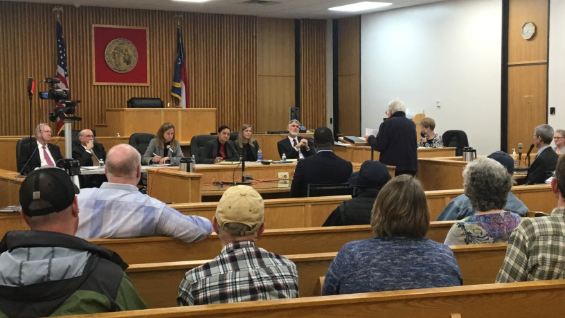 Residents speak out against Duke Energy’s latest rate hike proposal at the NC Utility Commission’s hearing in Franklin on Jan. 15
Residents speak out against Duke Energy’s latest rate hike proposal at the NC Utility Commission’s hearing in Franklin on Jan. 15
Last Wednesday, January 15, MountainTrue members and staff attended the NC Utilities Commission hearing in Franklin to speak out against Duke Energy’s latest energy rate hike proposal. If you haven’t seen it yet, check out the video of our Western Regional Director Callie Moore speaking at the hearing here.
If you couldn’t make the hearing, you can still take action to oppose the rate hike and learn more about Duke’s proposal here.
Central Regional News
For Buncombe, Madison, McDowell, Mitchell and Yancey counties
French Broad Riverkeeper Pens Op-Ed On Lake Julian Coal Ash Cleanup
 Supporters of MountainTrue and the Sierra Club take part in a float on Lake Julian to protest coal ash pollution in October 14, 2014. Photo: Courtesy photo by: Jeff Rich.
Supporters of MountainTrue and the Sierra Club take part in a float on Lake Julian to protest coal ash pollution in October 14, 2014. Photo: Courtesy photo by: Jeff Rich.
The Asheville Citizen-Times has published an opinion column by French Broad Riverkeeper Hartwell Carson, providing important technical information and historical context for the permit that Duke Energy is seeking as part of their cleanup of Lake Julian’s coal ash. As Hartwell makes clear: this is the resolution for which environmentalists and energy advocates have long fought — full excavation of all the remaining coal ash at Lake Julian and moving it to lined pits where it will stop polluting our groundwater and the French Broad River. Read more.
Learn Better Climate Change Communication Strategies At The Collider
Join MountainTrue, the Creation Care Alliance, the Sunrise Movement, UNCA Divest, the Wenoca group of the NC Sierra Club, Catawba Brewing and other co-hosts on January 23 from 5:30-7:30 PM for an engaging evening on effective strategies for communicating about climate change. We’ll have a brief reception in the Collider lobby with complementary beer and beverages at 5:30, followed by a program and discussion at 6.
Read more.
Event link: https://www.facebook.com/events/2848178995249271/
We’re Looking For An Intern To Join Our Water & Outreach Teams
MountainTrue will host a Community Outreach and Water Quality Intern through the Non-Profit Internship Program, funded in part by Z. Smith Reynolds Foundation. This intern will work with both our French Broad Riverkeeper team on water quality projects and also our Community Engagement Manager on outreach, education and advocacy campaign efforts. The application is due February 10, 2020 at 12:00 p.m. (noon). Learn more.
Guardians of Our Troubled Waters at New Belgium Brewing
The Center for Cultural Preservation’s Guardians of Our Troubled Waters documentary film tells the story of three communities in Western North Carolina, east Tennessee and south Florida. The film uncovers their historical connection to their rivers and streams, how that changed during the industrial age, and the early heroes who rose to unite the community to stand up for their waterways. Join us at New Belgium Brewing in Asheville on Tuesday, February 25 for folk music by Carol Duermit at 7:00 PM followed by a film screening at 7:30. More details: https://saveculture.org/product/guardians-of-our-troubled-waters-new-belgium/
Southern Regional News
For Cleveland, Henderson, Polk, Rutherford and Transylvania counties
Recycling Team Volunteers Brave The Weather To Recycle Hundreds Of Holiday Trees at Jackson Park in Hendersonville
Neither rain, nor snow, nor sleet, nor cold will keep our dedicated Recycling Team volunteers from saving the planet and reducing waste. Led by super volunteer Doreen Blue, the team recycled 560 holiday trees at our Annual Holiday Tree and Wreath Recycling Event on Saturday, January 11.

We also collected two huge boxes of cards, 10 large bags of lights, and broke down about 30 wreaths for recycling. Hendersonville and Henderson County staff were a big help running the heavy equipment and mulcher provided by King’s Hardware, and friends from the local 4-H Club were out in force to lend a hand as well. Thank you to all of our volunteers for your amazing dedication to this event each winter.
Western Regional News
For Cherokee, Clay, Graham, Haywood, Jackson, Macon and Swain counties in NC, and Towns and Union counties in GA
2019 Alternative Break Students Donate 1,200 Volunteer Hours to Restoring Native Habitats
MountainTrue West’s alternative breaks program went out with a bang! We hosted student groups from Saginaw Valley State University in Michigan and Georgia Southern University who helped us remove nonnative invasive plants like Chinese privet, Oriental bittersweet, multiflora rose and even kudzu. Altogether in 2019, we hosted 44 college student volunteers from five universities in three states, who donated more than 1,200 volunteer hours — worth $30,795 according to the value of volunteer time hourly rate established by Independent Sector for 2019. Work took place at several past stream restoration project sites, technical assistance locations, as well as the Riverwalk in Murphy, Cherokee County Heritage Park in Andrews and Mayor’s Park and Lloyd’s Landing in Hiawassee, Georgia.
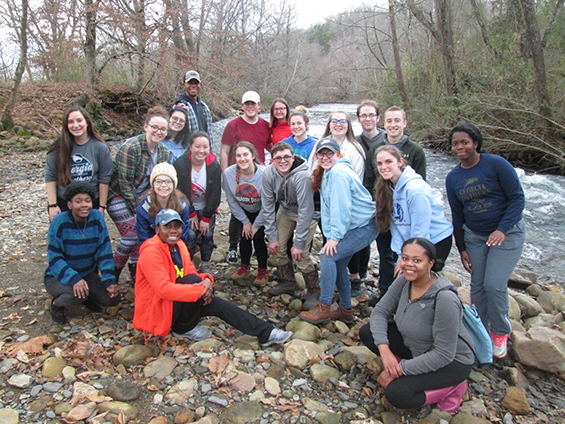
College volunteers from Saginaw Valley State University in Michigan and Georgia Southern University participated in an alternative winter break Dec 15-20, 2019.
The schools that participated in order of participation are: Univ. of Missouri (aka Mizzou), Eastern Michigan Univ., Grand Valley State Univ. (MI), Saginaw Valley State Univ. (MI), and, new to our program this year: Georgia Southern Univ. Fourteen community volunteers also participated in the effort by providing lunches for the students on every work day.
Several Ways To Participate In The 12th Annual Watershed Gala
The 12th Annual Watershed Gala and Holman Water Quality Stewardship Award presentation is coming up on Thursday, February 27, 2020. The event promises to be a delightful evening of food, laughter, and fun as we gather to celebrate good water quality and to honor this year’s Holman Water Quality Stewardship Award winner, Brenda K. Hull! The Gala is also a fundraiser for the MountainTrue Western Regional Office and there are a variety of ways you can participate:
- Become a sponsor – Our nearly 200 guests come not only from the local surrounding counties, but from places like Raleigh, Charlotte and Asheville, NC; Chattanooga and Knoxville, TN; and the greater Atlanta area. It’s a great opportunity to support clean water AND promote your business to a wider audience! To learn more, contact Development Director Adam Bowers at adam@mountaintrue.org
- Donate an auction or raffle item – The Gala begins with a silent auction featuring beautiful and unique art and craft items made right here in the Blue Ridge Mountains, as well as a variety of opportunities to dine and play! Following the meal and award presentation, several more exquisite items will be auctioned live by local auctioneer and entertainer, Tim Ryan. If you would like to donate arts and crafts, contact Western Regional Director Callie Moore at callie@mountaintrue.org
- Attend the event – Reservations are $50 each or $360 for a reserved table for eight, and must be made by February 20. Guest names and entree selections must also be provided prior to the February 20th deadline. Get your tickets here.
- Volunteer – Six to eight volunteers are needed to help with guest check-in, wrap-up the silent auction, sell raffle tickets and more. Unused sponsor seats are often available free to event volunteers. To volunteer, contact Western Regional Director Callie Moore at callie@mountaintrue.org
 Photo caption: Young Harris College students, Devin Filicicchia, Jessica Dudt, and Bethany Kenney pause for a photo during the 11th Annual Watershed Gala.
Photo caption: Young Harris College students, Devin Filicicchia, Jessica Dudt, and Bethany Kenney pause for a photo during the 11th Annual Watershed Gala.
Events & Volunteer Opportunities
Jan. 23: Climate Change Communications Strategies At The Collider.
Join MountainTrue and other co-hosts to learn effective strategies for communicating about climate change.
Feb. 1: Winter Tree ID Workshop At The Cradle of Forestry in Pisgah Forest
Join Carrie’s Tree School and MountainTrue’s Public Lands Biologist Josh Kelly for a day in the classroom and in the woods learning how to identify trees.
Feb. 7: Paddle-N-Plant Workday In Hendersonville
Combat sediment pollution of our local waterways with MountainTrue and the French Broad Riverkeeper. We’ll plant stakes that grow into trees which stabilize riverbanks and reduce erosion.
Feb. 7: Creation Care Retreat In Montreat
Designed with Creation care volunteers and clergy in mind, spend the day learning from and with a theologian, a climate scientist, a forest biologist, local colleagues and pastoral innovators.
Paddle-N-Plant Workdays In Valle Crucis
Come hop in a boat and help us reduce erosion along our local rivers by planting tree-cutting that grow into groundcover.
Feb. 9 workday
Feb. 16 workday
Mar. 13 workday
Mar. 20 workday
Feb 25: Guardians of Our Troubled Waters at New Belgium Brewing
This documentary film tells the story of three communities in WNC, east Tennessee and south Florida and the heroes who rose to unite these communities to stand up for clean water.
Feb. 27: 52 Weeks 52 Trees Art Exhibit In Flat Rock
Join us for the opening reception of an exhibition of paintings by artist Dale McEntire that are inspired by a love of the trees that surround us. Ten percent of proceeds from sales of paintings from the exhibition will be donated to MountainTrue.
Feb. 27: 12th Annual Watershed Gala In Young Harris
Join us at the 12th Annual Watershed Gala and Holman Water Quality Stewardship Award presentation for a delightful evening of food, laughter and fun, and to honor this year’s Holman Water Quality Stewardship Award winner, Brenda Hull!
Mar. 7: Spring SMIE Macroinvertebrate Training In Flat Rock
Become a citizen scientist and take part in our SMIE (Stream Monitoring Information Exchange) water quality monitoring program. Teams head out twice a year to creeks throughout Henderson and Polk counties to collect and identify aquatic insects — strong indicators of water quality.
Mar. 14: Annual Bird Watch At Lake Chatuge
Join MountainTrue and retired Young Harris College professor and former board member, Brenda Hull, to learn about and observe the birds of Lake Chatuge.
Mar. 21: Signs Of Spring Hike Into The Green River Gorge
Celebrate the arrival of spring with a moderate 6.8 mile out-and-back hike into the Green River Gorge. Guided by expert ecologist Bob Gale, we will search out the season’s first ephemeral wildflowers such as trillium, bloodroot and toothwort.
Call on NCDEQ: Update NC’s Spill Notification System to Keep People and Waterways Safe
Call on NCDEQ: Update NC’s Spill Notification System to Keep People and Waterways Safe
North Carolina’s notification system for pollution spills hasn’t caught up to modern times. The only public notice required for polluting our waterways is an outdated law that calls for polluters to send a press release and post an ad in a newspaper.
MountainTrue believes the public has a right to know about major pollution spills that impact our waterways as soon as possible, and through the technology the public uses today. Sign the petition below to tell NCDEQ: update NC’s spill notification system for the 21st century.
Many people no longer get their news from print newspapers, and in many WNC counties papers only run once or twice a week. Yet here’s the current state law: When a polluter spills over 1,000 gallons of sewage into a waterway, the polluter is required to notify the NC Department of Environmental Quality (NCDEQ) and to send out a press release to local news media within 24 hours. If a sewage spill is over 15,000 gallons, it must also be published in the newspapers of affected counties in the form of an advertisement within 10 days. For any other type of pollution, no public notification is required.
The current law means residents can be exposed to polluted waterways for days before learning about a spill in a newspaper – and newspapers aren’t even required to publish this news even then.
On January 14, MountainTrue’s water team will meet with DEQ staff to urge them to upgrade their spill notification system. But to win their support, we need to show them that the public cares about this issue.
Sign the petition below to tell the NC Department of Environmental Quality: Update your spill notification system for modern times to keep North Carolina’s people and waterways safe.

Historic Settlement Results In Largest Coal Ash Cleanup In America
Historic Settlement Results In Largest Coal Ash Cleanup In America
On January 2, MountainTrue, other community partners and our legal counsel the Southern Environmental Law Center (SELC) announced a historic settlement with Duke Energy and the N.C. Department of Environmental Quality.
The agreement mandates that 80 million tons of coal ash will be excavated from six Duke Energy coal ash sites: Allen, Belews Creek, Cliffside, Marshall, Mayo, and Roxboro. Prior settlements and court orders require cleanups and excavation of coal ash at the eight other Duke Energy sites in North Carolina for the excavation of 46 million tons of coal ash. This agreement now puts in place a comprehensive cleanup plan for all coal ash lagoons at all 14 Duke Energy sites in North Carolina under which 126 million tons of ash has been or will be excavated across the state and will result in the largest coal ash cleanup in America to date.
Statement from Julie Mayfield, co-director of MountainTrue:
With this settlement, Duke Energy has committed to fully excavating coal ash at the Rogers/Cliffside Energy Complex and moving it to a lined landfill where it will no longer pollute groundwater and the Broad River. This is the solution we’ve advocated for the last seven years, and it is a huge victory for our environment and for the front line communities most impacted by decades of coal ash pollution.
Statement from David Caldwell, Broad Riverkeeper:
Thanks should be given to the hundreds of local concerned citizens in Rutherford and Cleveland Counties, who showed up, stood up and spoke out at several public meetings. Together we were able to convince NCDEQ, our Department of Environmental Quality, and Duke Energy that moving all of the coal ash, a byproduct of 70 years of burning coal, to dry storage is the safest alternative to closing coal ash basins.
Read the full press release from SELC below.
For Release: January 2, 2020
Contact: SELC, Kathleen Sullivan, 919-945-7106 or ksullivan@selcnc.org
North Carolina Settlement Results in Largest Coal Ash Cleanup in America
Community Groups, N.C. DEQ and Duke Energy Reach Settlement to Clean Up Coal Ash at Six North Carolina Sites
CHAPEL HILL, N.C.—The Southern Environmental Law Center today announced it reached a settlement with Duke Energy and the N.C. Department of Environmental Quality to clean up coal ash at six North Carolina sites on behalf of Appalachian Voices, Stokes County Branch of the NAACP, MountainTrue, Catawba Riverkeeper Foundation, Waterkeeper Alliance, Sierra Club, Roanoke River Basin Association, Cape Fear River Watch, Neuse River Foundation/Sound Rivers, and N.C. State Conference of the NAACP. With this agreement, North Carolina will benefit from the largest coal ash cleanup in America to date.
Approximately 80 million tons of coal ash will be excavated from six Duke Energy coal ash sites: Allen, Belews Creek, Cliffside, Marshall, Mayo, and Roxboro. At each of these sites, coal ash is stored in unlined, leaking pits near waterbodies. Prior settlements and court orders require cleanups and excavation of coal ash at the eight other Duke Energy sites in North Carolina for the excavation of 46 million tons of coal ash: Asheville, Riverbend, Dan River, Sutton, Weatherspoon, Cape Fear, Lee, and Buck. This agreement now puts in place a comprehensive cleanup plan for all coal ash lagoons at all 14 Duke Energy sites in North Carolina under which 126 million tons of ash has been or will be excavated across the state.
In April 2019, the North Carolina Department of Environmental Quality (DEQ) ordered Duke Energy to clean up the remaining six coal ash storage sites in the state that were not yet slated to be cleaned up. Duke Energy appealed those orders, and the Southern Environmental Law Center intervened on behalf of community groups to support cleanup, alongside DEQ.
This agreement resolves Duke Energy’s pending appeals of DEQ’s April order, a state court enforcement proceeding brought by DEQ in which community groups represented by SELC are intervenors, and three federal court actions brought by SELC on behalf of the Roanoke River Basin Association, Stokes County Branch of the NAACP, N.C. State Conference of the NAACP, and Appalachian Voices.
Today’s settlement culminates efforts that began in 2012 when the Southern Environmental Law Center first went to court to seek cleanup of coal ash pollution on behalf of community groups in South Carolina and thereafter brought administrative and legal actions that sought coal ash cleanups in North Carolina. Now every utility in South Carolina is excavating its coal ash from every unlined lagoon in the state and cleanups are required and will be underway at every coal ash site in North Carolina. Coal ash has been, is being, and will be removed from coal ash pits owned by three utilities on rivers that flow through both states.
With the coal ash removal at Marshall and Allen in addition to prior commitments at other sites, approximately 44.5 million tons of coal ash has been and will be excavated from coal ash pits along the Catawba River in North and South Carolina. With the removals at Belews Creek, Mayo, and Roxboro, almost 40 million tons of ash in the Roanoke and Dan River Basins have been and are being moved to lined storage. Almost 17 million tons of coal ash will be removed at Roxboro and over 17 million tons of coal ash will be removed at Marshall while ash already in permitted landfills or structural fills will be subject to additional protective measures including stabilization actions and groundwater and surface water monitoring and remediation.
Over 8 million tons will be excavated at Cliffside on the Broad River.
“This agreement is the culmination of nine years of work by communities across North Carolina and puts in place the most extensive coal ash cleanup in the nation,” said Frank Holleman, senior attorney at the Southern Environmental Law Center which represents the community groups in court seeking coal ash cleanups in North Carolina. “With the agreements and court orders governing eight other coal ash sites, we now have in place a historic cleanup of coal ash lagoons to protect North Carolina’s clean water and families from coal ash pollution. North Carolina’s communities will be safer and North Carolina’s water will be cleaner than they have been in decades.”
Comments from the community groups represented by the Southern Environmental Law Center in various courts to seek cleanup of coal ash pollution at the six North Carolina sites follow.
Amy Adams of Appalachian Voices: “This agreement is a testament to the communities throughout North Carolina that have worked for years to protect their neighborhoods and clean water from coal ash pollution.”
Rev. Gregory Hairston of the Stokes County Branch of the NAACP: “We are thankful for the settlement and count it a major victory for our air, water and environmental justice in the state of North Carolina.”
Brandon Jones, Catawba Riverkeeper at the Catawba Riverkeeper Foundation: “This settlement is a fantastic victory for the Catawba and all North Carolinians and a major step towards protecting water quality for current and future generations. This is one of, if not the largest coal ash cleanup in American history. We are proud to have been a part of this effort from the beginning.”
Julie Mayfield, co-director of MountainTrue: “With this settlement, Duke Energy has committed to fully excavating coal ash at the Rogers/Cliffside Energy Complex and moving it to a lined landfill where it will no longer pollute groundwater and the Broad River. This is the solution we’ve advocated for the last seven years, and it is a huge victory for our environment and for the front line communities most impacted by decades of coal ash pollution.”
Larissa Liebmann, staff attorney at Waterkeeper Alliance; “Duke Energy is doing the right thing and protecting all North Carolina communities and waterways from its toxic legacy. North Carolina Waterkeepers and their partners worked tirelessly to stop the contamination of the
state’s waterways by toxic coal ash; this monumental agreement is a testament to their years of work.”
Dave Rogers, deputy regional director of Sierra Club’s Beyond Coal Campaign: “This agreement is a victory for communities and represents the culmination of years of work across North Carolina to guarantee protections from toxic coal ash pollution for hundreds of families and children.”
Statement by Gene Addesso, Mike Pucci and Greg Goddard, leaders of the Roanoke River Basin Association: “Under this agreement, the Roanoke River and Dan River Basins will see one of the largest coal ash cleanups in the country, with millions of tons of coal ash being moved to lined storage at the Dan River, Belews Creek, Roxboro, and Mayo sites on the river system that flows through communities in North Carolina and Virginia.”
Reverend Dr. T. Anthony Spearman of the N.C. State Conference of the NAACP: “Coal ash pollution is an environmental justice issue, and this agreement will bring more justice to the communities around coal ash sites in North Carolina.”
###
For more than 30 years, the Southern Environmental Law Center has used the power of the law to champion the environment of the Southeast. With more than 80 attorneys and nine offices across the region, SELC is widely recognized as the Southeast’s foremost environmental organization and regional leader. SELC works on a full range of environmental issues to protect our natural resources and the health and well-being of all the people in our region. www.SouthernEnvironment.org
Dec. Vistas E-News
Dec. Vistas E-News
On Jan. 15, Tell The NC Utilities Commission: No Rate Hikes For Dirty Energy!
Duke Energy is trying to raise our electric bills to pay for dirty energy. Again. Their new rate hike proposal lacks any direct investment in renewable energy and calls for customers to foot the bill to clean up coal ash. It would also be their fifth rate hike in ten years, and would increase residential electricity costs by another 6.7% – or about $97 more per year for the average electricity user.
Join MountainTrue members in Franklin on January 15 and in Morganton on January 16 to tell the NC Utilities Commission: Enough is enough. No rate hikes for more dirty energy. Learn more.
Calling Volunteers Who Like To Hike!
The draft Environmental Impact Study for the next forest management plan for the Pisgah and Nantahala National Forests is due in February of 2020, and we are looking for volunteers who are interested in talking to hikers, anglers, birders or any type of recreational user at trailheads and parking lots about how they can help ensure the places they like to access are protected. If you’re interested in being part of our trail outreach team, please fill out this short sign-up form.
Central Regional News
For Buncombe, Madison, McDowell, Mitchell and Yancey counties
We Protected 140 Ash Trees In 2019
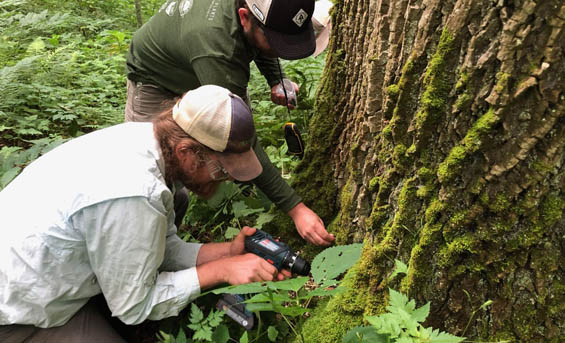
Thanks to funding from the Appalachian Trail Conservancy‘s (ATC) License Plate Grants, MountainTrue and the ATC completed the third consecutive year of ash tree treatments on the Appalachian Trail. This year, we were able to protect more than 140 trees and three miles of trail from the emerald ash borer beetle (EAB) — an invasive pest that kills all untreated ash trees. In three years, ATC and MountainTrue have worked together to save more than 900 beautiful ash trees from EAB along more than 11 miles of trail. These are likely to be the most extensive areas of ash trees remaining in the Southern Blue Ridge after the onslaught of EAB passes.
High Country Regional News
For Alleghany, Ashe, Avery, Burke, Caldwell, Watauga and Wilkes counties
Help Andy Fight Microplastics in the Watauga Basin

Plastics are everywhere, including the Watauga River. They break down into smaller bits of plastic that end up being eaten by fish and other aquatic life and can bioaccumulate up the food chain. Help our Watauga Riverkeeper Andy Hill as he launches our microplastic survey of the Watauga Basin this spring. We are looking for volunteers to help collect water samples. Sign up here.
Sign up for our 2020 Livestaking Days
Please join us to help plant tree cuttings that will grow into shrubs and trees and help keep stream and river banks from eroding. “Paddle and Plant” workdays will be held by MountainTrue at Valle Crucis Community Park on February 9, February 16, March 13, March 20.
Southern Regional News
For Cleveland, Henderson, Polk, Rutherford and Transylvania counties
Thanks To All Of Our Wonderful Volunteers!

We couldn’t do everything we do without our amazing volunteer force which helps us with water quality sampling, river cleanups, fighting invasive plants and pests, advocating on a range of issues, and much more. On December 11, we had the pleasure of gathering with many of our volunteers from MountainTrue’s Southern Region at Guidon Brewing Company in Hendersonville. We enjoyed beverages donated by the brewery, handed out some door prizes to a lucky few, and celebrated our accomplishments over the past year with some holiday cheer. Our sincerest gratitude goes out to all of you that make our work possible and successful, and happy holidays!
Poop Patrol Identifies Some Problem Bacteria Hot Spots In The Mud Creek Watershed

Throughout the summer, our Swim Guide bacteria monitoring team found high levels of E. coli at sites along Mud Creek. To track down the source of the pollution, we enlisted the help of the Hendersonville Rotary Club. Their volunteers took weekly samples at over 20 sites in the Mud Creek watershed around Hendersonville. In all, they collected more than 130 water samples, which allowed MountainTrue’s Water Quality team to isolate two major hot spots of pollution that we suspect are related to pockets of homes that are not connected to the municipal sewer and instead have septic systems that are likely failing. We are now working with the City of Hendersonville, Henderson County Health Department, and NC Department of Environmental Quality to further isolate the problems and implement solutions.
Western Regional News
For Cherokee, Clay, Graham, Haywood, Jackson, Macon and Swain counties in NC, and Towns and Union counties in GA
Take A Look Back At Our 2019 Western Region Successes
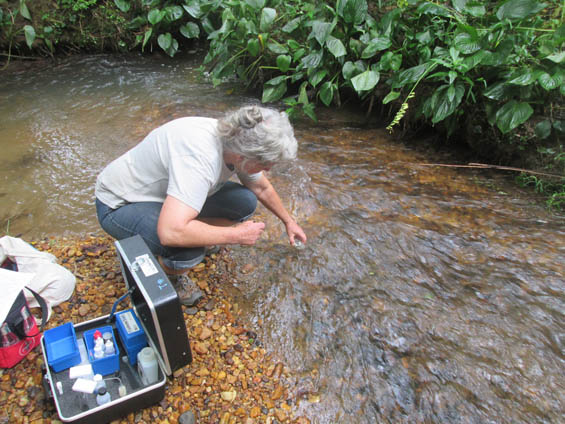 Trained volunteers collect water samples from area waterways to help MountainTrue keep tabs on stream condition and suitability for recreation.
Trained volunteers collect water samples from area waterways to help MountainTrue keep tabs on stream condition and suitability for recreation.
Effective environmental organizations tend to be very forward-focused in their work, but as we turn the page on 2019, we’d like to take a moment to look back on what we’ve been able to accomplish together over the past year. You’re hearing a lot about MountainTrue’s overall accomplishments through emails and mailings, particularly with regard to protecting our public lands. Here are a few of the MountainTrue West region-specific projects and accomplishments from 2019:
- Monitored bacteria levels at several popular recreation areas on the Pigeon River weekly throughout the summer months and posted results on the Swim Guide website.
- Advocated for stronger water quality protections associated with a dredging and development project in the headwaters of the Chattooga River Watershed at a public hearing in Cashiers, NC.
- Worked with two partners, WATR (Watershed Association of the Tuckasegee River) and Trout Unlimited, to come up to speed on sediment pollution violations from massive amounts of development in the Tuckasegee River Watershed. (Protecting this river in the face of continued development is a top priority for MountainTrue West in 2020.)
- Advocated alongside several other partners for better Corridor K alternatives in the Cheoah River and Valley River watersheds, successfully defeating two particularly bad new road alignments that would’ve fragmented large sections of the National Forest and negatively impacted streams and special places in Graham and Cherokee counties.
- Helped organize a landowner outreach event for the Southeastern Hellbender Conservation Initiative in the Little Tennessee River Watershed.
- Supported a team of certified volunteers who monitored water quality, including the monthly monitoring of bacteria levels at 47 locations in the Hiwassee River Watershed. Also provided technical assistance to 17 landowners and completed a stream bank stabilization and buffer project along Davis Creek in Cherokee County.
- Held the 9th Annual Lake Chatuge Shoreline Cleanup and worked with the City of Hiawassee, GA and Hamilton Gardens on projects to eradicate kudzu and other non-native invasive plants.
- Monitored water chemistry weekly in Butternut Creek just upstream of its confluence with Lake Nottely following the City of Blairsville’s decision to begin treating landfill leachate on a contract basis. No negative change in water quality has been detected downstream of the wastewater treatment plant as a result of this decision.
Events & Volunteer Opportunities
Jan 11: Give Your Christmas Trees A Second Life In Hendersonville
Recycle your Christmas trees, cards and wreaths and turn them into mulch for your garden and trees.
Jan 15 & 16: Duke Energy Rate Hike Hearings In Franklin And Morganton
Duke Energy is trying to raise our electric bills to pay for dirty energy. Again. Let your voice be heard at public hearings in Franklin and Morganton.
Jan. 18: Timber Sale Project Hike In Clay County
Join us for a hike to the part of Nantahala National Forest that will be impacted by the Buck Creek Timber Sale. Public Lands Biologist, Josh Kelly, will explain how timber sales work and how MountainTrue evaluates their impacts.
Feb. 1: Winter Tree ID Workshop At Cradle Of Forestry
Join MountainTrue and Carrie Blair of Carrie’s Tree School for a workshop on the basic techniques of tree identification.
Feb 7: Creation Care Retreat At Montreat
Designed with creation care volunteers and clergy in mind, spend the day learning from and with a theologian, a climate scientist, a forest biologist, local colleagues and pastoral innovators.
Paddle-N-Plant Workdays In Valle Crucis
Come hop in a boat and help us reduce erosion along our local rivers by planting tree-cuttings that grow into groundcover.
Feb. 9. workday https://mountaintrue.org/event/hco-paddle-n-plant-workday-5/
Feb. 16. workday https://mountaintrue.org/event/hco-paddle-n-plant-workday-6/
Mar. 13 workday https://mountaintrue.org/event/hco-paddle-n-plant-workday-8/
Mar. 20 workday https://mountaintrue.org/event/hco-paddle-n-plant-workday-7/
Mar. 21 – Signs Of Spring Hike Into The Green River Gorge
Celebrate the arrival of spring with a moderate 6.8 mile out-and-back hike into the Green River Gorge. Guided by expert ecologist Bob Gale, we will search out the season’s first ephemeral wildflowers such as trillium, bloodroot, and toothwort.
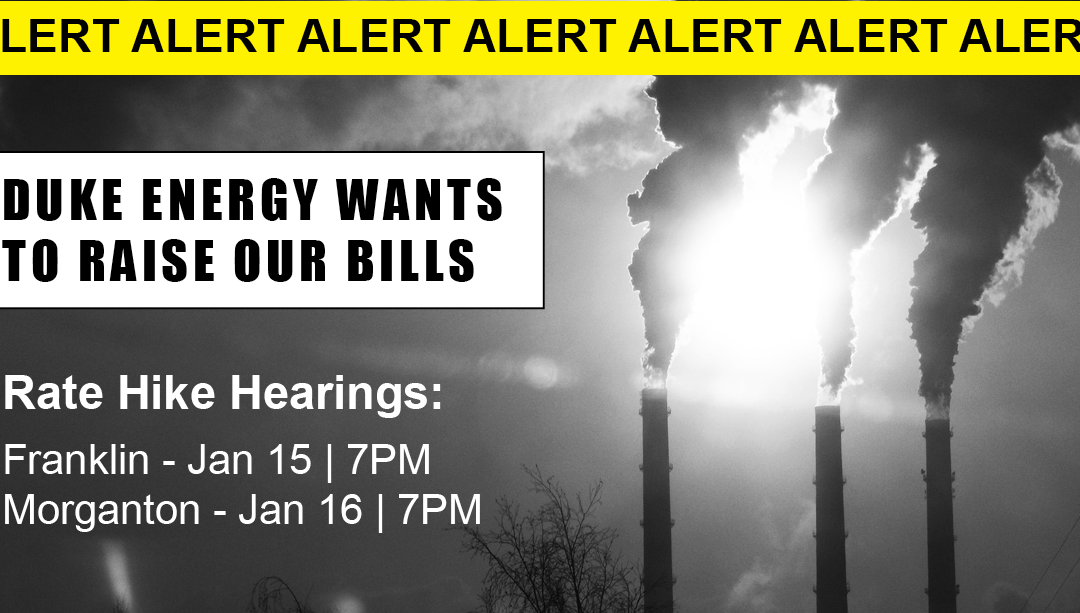
On Jan. 15, tell the NC Utilities Commission: No Rate Hikes for Dirty Energy!
On Jan. 15, tell the NC Utilities Commission: No Rate Hikes for Dirty Energy!
Duke Energy is trying to raise our electric bills to pay for dirty energy. Again. The company’s latest rate hike proposal would increase residential electricity costs by another 6.7% – or about $97 more per year for the average electricity user.
Duke’s proposal lacks any direct investment in renewable energy and would raise our rates to burn more gas, create a “deferral” account of up to $2.5 billion for Duke to access in a future rate hike, and call for customers to foot the bill to clean up coal ash – even though Duke knew this coal ash was toxic as far back as the 1980s, and did nothing to prevent it. The rate increase would also come only two years after their last rate hike, and would be their fifth rate hike in ten years.
Join MountainTrue members in Franklin on January 15 and in Morganton on January 16 to tell the NC Utilities Commission: Enough is enough. Don’t let Duke pass the bill for more dirty energy to customers.
Rate Hike Hearing in Franklin
Wednesday, January 15 at 7:00PM
Macon County Courthouse
5 W. Main Street
Franklin, NC 28734
Rate Hike Hearing in Morganton
Thursday, January 16 at 7:00PM
Burke County Courthouse
201 South Green Street
Morganton, NC 28655
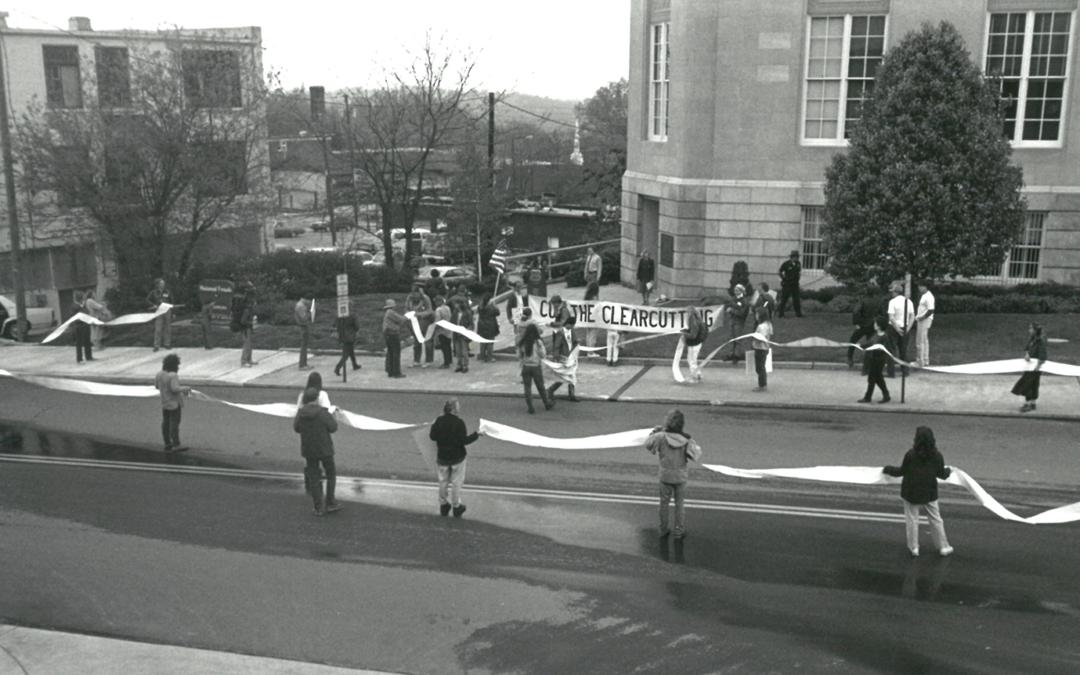
The fate of 1 million acres of our nation’s most important forest lands is in your hands.
The fate of 1 million acres of our nation’s most important forest lands is in your hands.
Nantahala and Pisgah National Forests could be next on the cutting board.
The next 20-year forest management plan for Nantahala and Pisgah National Forests will be released soon, and it could have a dramatic impact on the health of our public lands.
Will you protect our national forests? Our goal is to raise $30,000 before the end of the year. Whether it’s $10 or $1,000, your gift makes sure our team of experts has the resources to fight for a better forest management plan. Join the thousands of MountainTrue members and supporters in standing up for Nantahala and Pisgah National Forests.
Support MountainTrue’s Public Lands Team. With more than 50 years combined experience working for you, we fight to protect habitats that support vulnerable species, safeguard old-growth forests, and make sure you have wonderful outdoor spaces for biking, hiking, hunting, fishing and foraging.
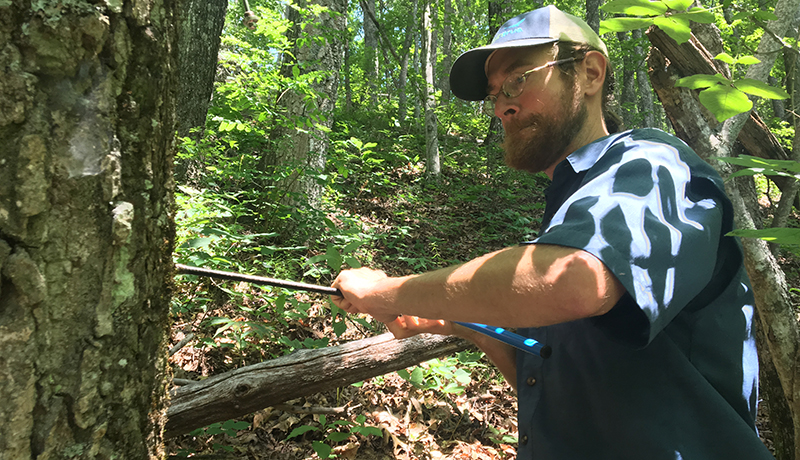
Donate to MountainTrue today and protect places like Pisgah National Forest — because it’s the right thing to do now and for future generations. We can only do this with your support.
MountainTrue has a record of success when it comes to fighting for our forests.
In the 80s and early 90s, MountainTrue (then the Western North Carolina Alliance) collected more than 16,000 signatures opposing the practice of clearcutting — and the resulting petition was the length of three football fields. Through our collective action, we pressured the Forest Service to cut the maximum allowable harvest in half, stopped the practice of clearcutting in Nantahala and Pisgah National Forests, and put water quality protections and old-growth forest restoration in place.
Join MountainTrue and strengthen our collective voice. With your help we can:
- be a voice for the wild and roadless parts of the forest,
- protect existing old-growth forests,
- educate and inform the public with professional analysis,
- provide technical comments to the Forest Service, and
- organize public participation in meetings and comment periods, making it difficult for the Forest Service to ignore the people who speak for the trees.
Thank you for standing with our beloved national forests. Remember, you can make a small donation that will have a big impact by signing up for monthly giving.
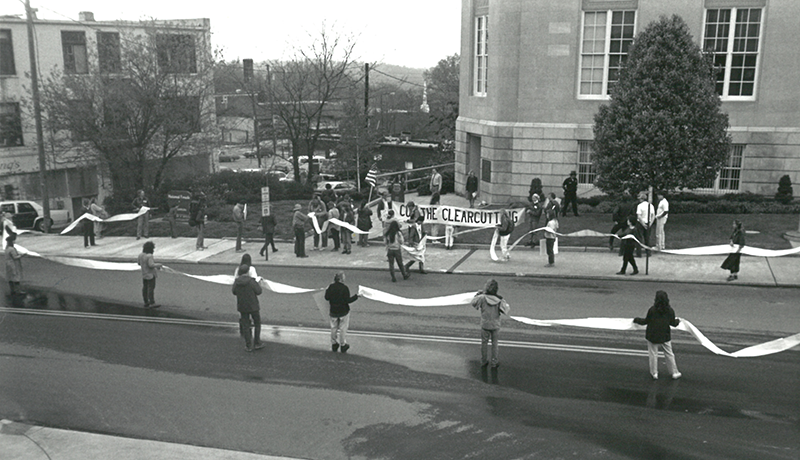
Protect The Places We Share
Have fun with us, learn more about the incredible natural treasures of our region, and make a difference in your community.

MT Raleigh Report Yearly Wrap Up: The Budget, Wins for the Environment and Looking Ahead to 2020
MT Raleigh Report Yearly Wrap Up: The Budget, Wins for the Environment and Looking Ahead to 2020
Dec. 10, 2019
It’s been a strange year at the North Carolina General Assembly.
There have been lots of votes – and vetoes – on various budget bills, but no final state budget. There was just a smattering of problematic environmental bills, the worst of which either didn’t pass or were defanged before becoming law.
Then there’s the legislative session itself, which started in January but didn’t end until Halloween – only to be serialized in November and when the legislature is scheduled to come back in January.
Confused? No worries. We’re here for you with a quick rundown on what happened this year at the legislature and where things stand as the political stalemate between Governor Roy Cooper and the GOP-controlled legislature continues into the new year.
The Budget
You’ll recall that Governor Cooper vetoed the legislature’s budget for the 2019-2021 biennium earlier this summer. Governor Cooper wants the General Assembly to include expanded Medicaid coverage for more than 500,000 North Carolinians in the budget. Most Republicans in the legislature disagree. The result is a political and policy battle in which the two sides have been sparring about budget issues all year. In a surprise September vote, the House overrode the Governor’s veto, but the Senate has not been able to find the votes needed to complete the override. Thus the state’s budget stalemate.
With a budget deal stalled, the legislature has moved sections of their overall budget into separate “mini-budget” bills and sent them to Governor Cooper – some of which he has signed, while vetoing others.
So what does the budget battle mean for the environment? For starters, important funding for open space conservation has not been approved. Also held up is funding for a variety of conservation and water quality projects that MountainTrue supported in the legislature’s budget this year. The budget stalemate has also stalled funding for expanded water quality testing in the French Broad River and other WNC rivers to address E. coli pollution that can make people sick.
The budget impasse also cuts off new investments in the NC Department of Environmental Quality’s ability to protect water quality. The Cooper administration requested 37 new water quality positions, of which the legislature funded five. DEQ Secretary Michael Regan described the legislature’s budget for the Department as insufficient to protect the state’s natural resources.
When will the budget battles in Raleigh end? That’s the $24 billion question. Senate Republicans need just one or two Democrats to join them in overriding the Governor’s veto. So far, the Democrats in the Senate are sticking with Governor Cooper, who continues to call on GOP lawmakers to negotiate a budget deal. Lawmakers will return to the legislature on January 14 to continue their 2019 work.
Environmental Wins
Without the veto-proof majorities necessary to easily override Governor Cooper’s veto, Republican lawmakers have significantly reduced the number of bills sent to the Governor for approval. This has resulted in fewer environmental bills being taken up, let alone approved, during the 2019 session.
The biggest environmental bill of the session, SB559, put renewable energy advocates as well as many industries on red alert over a provision to allow the North Carolina Utilities Commission to approve electrical rate increases up to five years in advance in a single proceeding. Advocates including MountainTrue were concerned that the bill would reduce public feedback and transparency about rate increases, making it easier for utilities to pass costs onto their customers. The bill would have also allowed utilities more cushion on their allowed earnings, including a “band” of allowed profit above and below a certain percentage.
After months of debate, a veto threat by the Governor, and weeks of behind-the-scenes negotiating, the most controversial sections of the bill were turned into a study and the bill was signed into law by Governor Cooper. This was a big win for renewable energy supporters and consumer advocate groups.
This moderating trend for environmental bills also showed up in the debate about a bill reducing local governments’ regulation of billboards. After a veto by Governor Cooper this summer, supporters of the bill have been unable to muster the votes necessary to override the veto, essentially killing the bill altogether – and giving environmentalists and local governments another win.
And for those of you in need of an unarguably positive and feel-good environmental story, we give you the legislature’s authorization of the new Pisgah View State Park, which will preserve 1,600 acres in Buncombe and Henderson Counties. Three Republican Senators – Senator Chuck Edwards, R-Buncombe, Henderson, Transylvania; Senator Ralph Hise, R-McDowell, Mitchell, Polk, Rutherford and Yancey; and Senator Jim Davis, R-Cherokee, Clay, Graham, Haywood, Jackson, Macon and Swain, introduced the bill in April. It was passed unanimously by the Senate in June and by the House in early July, where it was championed by Representative Brian Turner, D-Buncombe, and Representative Chuck McGrady, R-Henderson. The park is expected to cost $18.1 million and to take five years to complete.
Looking Ahead
With the General Assembly out of session until January 14, its agenda in the new year is still unclear. Senate Republicans will almost certainly continue to try to find a few Democrats to help them override the Governor’s budget veto. If the Senate does not override the budget veto, the legislature may continue to send Governor Cooper more mini-budget bills. Some House Republicans, led by Rep. Chuck McGrady, would also like to invest state funding in a variety of strategies to make North Carolina more resilient to storms and flooding – not only on the coast but, hopefully, in the mountains as well. These strategies include increased funding to buy out industrial hog operations with a history of pollution problems in the flood plain, as well as assistance to local governments to improve flood control infrastructure. While the Senate’s appetite for these investments is unclear at the moment, MountainTrue will support these appropriations and remind all legislators that, like the coast, WNC needs new investments to prepare for the bigger and more frequent storms and fire seasons we can expect as a result of climate change.
Finally, a note of thanks. MountainTrue is the only WNC environmental organization with a lobbyist in Raleigh. This makes us a stronger advocate for our region in the state capitol, which wouldn’t be possible without your support. Thank you for your part in our 2019 policy work, and we hope you will continue to be part of our team here in WNC as well as in Raleigh in 2020.

